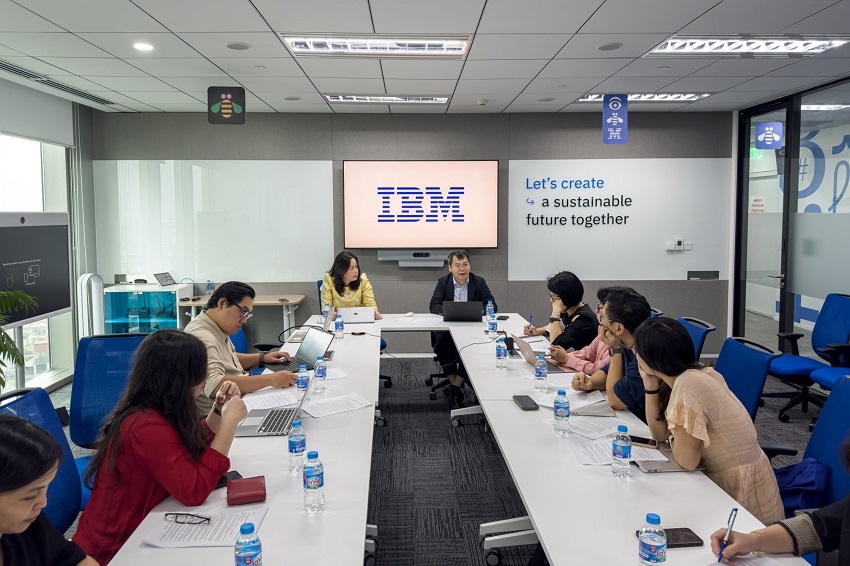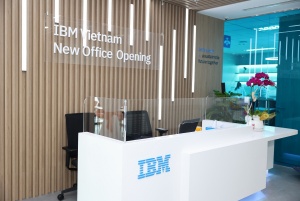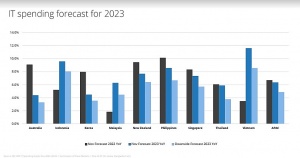IBM: Five top trends for 2024 to enhance Vietnam's digital economy
As one of the most transformative technologies of our time, AI is projected to unlock an astounding $16 trillion in value by 2030, fuelling growth and helping to address some of the most pressing challenges in healthcare, manufacturing, food production, and climate change.
Two critical elements fundamentally define Vietnam’s economic resilience and advancement, technological innovation and superior productivity.
 |
| Pham Thi Thu Diep, country general manager of IBM Vietnam |
Pham Thi Thu Diep, country general manager of IBM Vietnam said, "As businesses become more productive, the nation becomes more competitive and prosperous. This is where advanced technologies like generative AI come into play."
In Vietnam, generative AI helps to boost production capacity in essential sectors such as banking, manufacturing, retail, and agriculture. The nation leads in terms of interest in generative AI, with 91 per cent showing enthusiasm – the highest among surveyed markets, according to Finastra Financial Services' State of the Nation Survey 2023.
Vietnam has achieved the fastest-growing digital economy in Southeast Asia for the second year in a row. Across the region, digital payment adoption has reached 50 per cent, and this is growing by 19 per cent annually in Vietnam, according to the eighth Southeast Asia Digital Economy report by Google, Temasek, and Bain & Company that was released in November.
Statista Market Insights said that the size of the generative AI market in Vietnam is projected to reach over $100 million by year-end.
Designing for AI first, not as an afterthought
Three out of four CEOs have noted that competitive advantage depends on who has the most advanced generative AI. Yet more than 60 per cent are still not developing a consistent, enterprise-wide approach.
An IBM's study shows that two thirds of CEOs are acting without a clear view of how to help their workforce with the disruption and inevitable change that AI brings. Furthermore, fewer than a third have conducted an assessment on the potential impact of generative AI on their workforce.
"There is no going back with generative AI. But that doesn’t mean there won’t be some pumping of the brakes in 2024. To lead with responsible AI, executives and their organisations need to demonstrate wisdom, ethics, and care for their stakeholders," said Diep.
Those who use AI will replace those who don't
In 2024, generative AI will impact virtually all positions and levels. 77 per cent of entry-level staff will see their roles shift by 2025, along with more than 25 per cent of senior executives.
"As generative AI matures rapidly, an increasing number of people at all levels will be more severely impacted by it. For example, in five years, the majority of government leaders expect to spend more on AI and automation than on human talent," she said.
Successful AI adoption depends on teams welcoming new AI tools and applications. CEOs estimate that 40 per cent of their workforce needs to reskill as they implement AI and automation over the next three years.
Currently, 87 per cent of CEOs expect job roles to be augmented rather than replaced by generative AI, with personnel having to trust their new AI counterparts to drive success.
 |
Data conversation
The IBM research has shown that data is the lifeblood of every organisation. It flows everywhere to inform strategy, operational decisions, and innovation. Trusting the data is more important than ever, so it must be secure and protected.
"Organisations that can monetise their large stores of trusted, high-quality data realise almost double the return on investment from their AI capabilities than their peers," Diep revealed.
With these returns at risk, it is no surprise that in 2024, data is no longer just a concern; it’s a business imperative with massive strategic significance.
Operating models that bend so they don't break
Building an AI operating model that flexes with the times to cull patterns from unstructured external data, incorporates internal patterns, and accommodates organisational management principles allows businesses to weather shocks and respond in almost real-time.
2024 is set to see generative AI-enabled dashboards become even more sophisticated, enabling visibility and responsiveness to the ever-growing array of shocks.
Ecosystems are not part of the strategy, they are the strategy
As enterprises try to build trust with their customers, their ecosystems can either help or hinder. In 2024, these should finally evolve from a collection of separate entities and band together to achieve separate but aligned goals.
Open innovation is tied to revenue growth, and the ecosystem is key to this. The growth among open innovation leaders is already 59 per cent higher than among their peers. Yet for open innovation to prosper, data must flow freely and securely across the ecosystem.
 | Taking the right steps for successful digital transformation With Vietnam accelerating the development of its digital economy, businesses are now in an all-out rush to adopt technology, invest in and develop digital solutions, and move on platforms to exploit larger markets without geographical boundaries. Pham Thi Thu Diep, technology and country leader at IBM Vietnam, spoke with VIR's Bich Thuy about the strategic steps enterprises should take to enable a successful digital transformation. |
 | Vietnam businesses showcase ‘new era of innovation’ with IBM Several key announcements from IBM across Cloud, AI, and Good Tech signal progress towards digital transformation in Vietnam. |
 | Essential digitalisation trends for reducing business costs Technology is the only way for businesses to achieve true cost reductions and resilience, according to an IBM media panel on December 2. |
 | BIDV selects IBM API Connect to enhance banking experience BIDV announced on August 23 its selection of IBM API Connect as the platform to build a new API management system to maximise the digital banking experience of its clients. |
What the stars mean:
★ Poor ★ ★ Promising ★★★ Good ★★★★ Very good ★★★★★ Exceptional
Related Contents
Latest News
More News
- Financial sector charts next steps as Party Congress convenes (January 21, 2026 | 09:58)
- Three key dynamics supporting Vietnam’s GDP growth in 2026 (January 20, 2026 | 16:34)
- Carlsberg Vietnam and Grab encourage responsible enjoyment and safer mobility (January 16, 2026 | 19:55)
- Redefining Vietnam’s growth model for the era of innovation (January 16, 2026 | 16:40)
- Nghi Son refinery processes first non-Kuwaiti crude cargo (January 16, 2026 | 16:06)
- Siemens and VSIP announce landmark strategic partnership (January 15, 2026 | 14:48)
- VinFast sets record with 175,099 electric vehicles delivered in Vietnam in 2025 (January 15, 2026 | 14:24)
- Year-end shopping season faces rising uncertainty (January 14, 2026 | 18:11)
- State sector sees broad-based profit surge as major groups deliver strong results (January 13, 2026 | 17:34)
- HSBC forecasts Vietnam's GDP growth to hit 6.7 per cent in 2026 (January 13, 2026 | 17:33)

 Tag:
Tag:

























 Mobile Version
Mobile Version